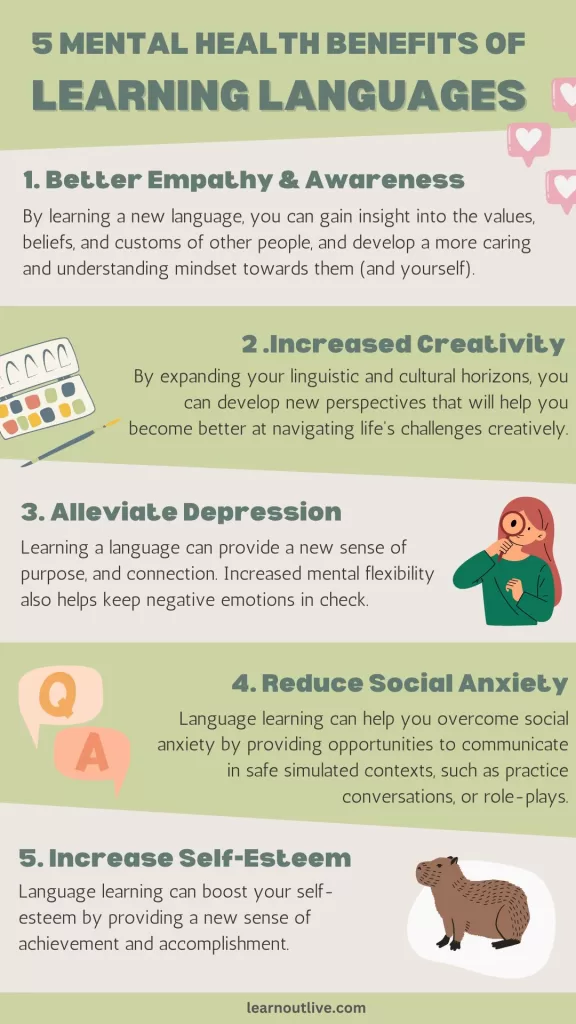
Learning a new language can open new career opportunities and act as a gateway to other cultures, but did you know that there also many mental health benefits of learning a new language?
It can boost your self confidence, enhance empathy and cultural awareness, spur creative thinking and even alleviate symptoms of depression.
Before we delve into the mental health benefits in more detail, let’s have a brief look how learning a new language physically affects the brain and cognitive function.
Cognitive benefits of language learning
Learning a new language is not only a rewarding and enjoyable experience, but also immensely beneficial for the brain. According to various studies, learning a new language changes the brain at a physical level, enhancing its structure and function.
For example, studies have shown that bilingual people have denser grey matter and increased white matter integrity compared to monolinguals.
More Grey Matter & White Matter
Grey matter is the part of the brain that contains neurons and dendrites, which are responsible for processing information and executing tasks. Bilingual people have more of these neurons and dendrites than monolingual people, which means that their grey matter is denser.
This implies that they have more brain power and cognitive resources to perform complex mental activities (not just limited to language learning).
White matter is the part of the brain that contains nerve fibres that connect different regions of the brain and facilitate communication between them. Bilingual people have increased white matter integrity compared to monolingual people, which means that their nerve fibres are more robust and efficient. This enhances their ability to learn and function in various domains.
Increased Flexibility
These physical changes in the brain are the result of learning a new language, which requires extensive neuroplasticity. Neuroplasticity is the ability of the brain to reorganize itself and form new connections and pathways in response to new experiences and challenges.
Learning a new language is one of the most complex and stimulating experiences for the brain, as it involves novelty, practice, memorization, recall, and production. Therefore it can boost the brain’s reserves and potentially even protect it from degeneration and dementia (more about this below).
How does language affect cognitive function?
Language learning is a powerful way to enhance one’s cognitive abilities. Research has shown that learning a new language can improve various aspects of cognition, such as focus, memory, and overall mental performance.
Increased Attention Span & Task-Switching
One of the benefits of language learning is that it can increase one’s attention span and ability to switch between tasks. This is because learning a new language requires constant attention to the sounds, words, grammar, and meaning of the target language, as well as the ability to switch between the native and the foreign language.
This trains the brain to filter out irrelevant information and focus on what is important.
Memory Capacity & Retention
Another benefit of language learning is that it can boost one’s memory capacity and retention. This is because learning a new language involves memorizing a large amount of vocabulary, rules, and structures, as well as recalling them when needed. This strengthens the connections between neurons in the brain and enhances the ability to store and retrieve information.
Moreover, language learning can improve one’s overall cognitive abilities and prevent cognitive decline. This is because learning a new language stimulates various regions of the brain and increases its plasticity and adaptability.
This means that the brain can reorganize itself and form new connections in response to new challenges and experiences. This can help the brain cope with aging and protect it from diseases such as Alzheimer’s and dementia.
In other words, language learning can have positive effects on one’s cognition in both young and older adults. By learning a new language, you can sharpen your focus, strengthen their memory, and boost their mental performance.
Put simply, language learning is not only a valuable life skill, but also a beneficial exercise for the brain. It’s like a gym for your neurons!

Mental health benefits of language learning
Naturally, language learning is not only a cognitive activity, but also a social and emotional one. So, learning a new language can have positive effects on one’s mental health in various ways.
Let’s take a look how language learning can increase empathy and cultural awareness, foster creativity, alleviate negative emotions, reduce social anxiety, and even lead to a surge in self-esteem.
1. Empathy & Cultural Awareness
One of the benefits of language learning is that it can enhance one’s empathy and cultural awareness. Empathy is generally defined as the ability to understand and share the feelings of others, while cultural awareness deals with the recognition and appreciation of the diversity of cultures and perspectives in the world.
Language learning can foster these skills by exposing learners to different ways of thinking, expressing, and behaving that are influenced by the language and culture of the speakers.
By learning a new language, you can gain insight into the values, beliefs, and customs of other people, and develop a more open-minded and respectful attitude towards them (and yourself!).
Language learning can also help learners to overcome stereotypes and prejudices that may exist in their own culture or society.
2. Increased Creativity
Another benefit of learning a new language is that it boosts your creativity. As we’ve seen above, learning a new language exposes you to different cultures, expressions, and ways of thinking, which can stimulate your imagination and curiosity.
By expanding your linguistic and cultural horizons, you can also develop new perspectives and insights that can enrich your creative thinking and expression.
Creativity is not only useful for artistic endeavors, but also for problem-solving and coping with challenges in daily life.
When you learn a new language, you encounter different types of problems, such as grammatical rules, vocabulary gaps, or communication barriers. To overcome these problems, you need to use your creativity to find solutions and alternatives.
For example, you might use gestures, synonyms, or examples to convey your meaning. Similarly, when you face challenges in your personal or professional life, you can apply the same creative skills to cope with them and find positive outcomes.
3. Alleviate Symptoms of Depression
According to the World Health Organization an estimated 3.8% of the population experience depression. Depression affects a person’s mood, thoughts, and behavior, and can make you feel hopeless, worthless, and isolated.
While learning a language is obviously not a replacement for professional therapy and medication, it can help alleviate some of the more negative symptoms of depression. How?
Learning a new language can provide you with a sense of achievement, purpose, and connection. You can discover new cultures, connect with new people, and explore new interests that can enrich your life and give you hope.
Unfortunately depression doesn’t just affect a sufferer’s emotional state, but also has detrimental effects on one’s cognitive abilities, leading to “executive dysfunction, impaired learning and memory, reduced attention and concentration” (source).
The good news is that, as we’ve seen above, learning a new language can challenge your brain, improve your memory, and enhance your creativity. All these cognitive benefits can help fight off the effects of depression on your mental abilities.
It can also help you express your emotions better and change your perspective on life. You can learn new words and phrases that capture your emotions more accurately and precisely. Last but not least, you’ll learn how different cultures view and deal with depression, which can help you gain new insights and perspectives on your own situation.
4. Reduce Social Anxiety
Another cool benefit of language learning is that it can reduce social anxiety. Social anxiety is the fear of being judged or rejected by others in social situations. It can affect one’s confidence, communication, and relationships.
Language learning can help to overcome social anxiety by providing learners with opportunities to practice their language skills in safe simulated contexts, such as conversations or role-plays, before venturing out into the world and practicing in real-life situations.
You can join a language class, find a language partner, or use online platforms to practice speaking with native speakers. All these activities can help you build confidence, reduce stress, and make new friends.
By doing so, learners can improve their fluency, accuracy, and pronunciation, and become more comfortable and confident in speaking the language. Language learning can also help learners to cope with their anxiety by teaching them strategies to deal with mistakes, feedback, or misunderstandings that may occur in communication.
5. Increased Self-Esteem
A fifth benefit of language learning is that it can lead to a surge in self-esteem. Self-esteem is the degree to which one values oneself and one’s abilities. It can affect one’s motivation, performance, and well-being.
Language learning can boost one’s self-esteem by providing learners with a sense of achievement and accomplishment.
Learning a new language is a challenging and rewarding process that requires dedication, effort, and perseverance. By setting and reaching realistic goals, overcoming difficulties, and making progress in the language, learners can feel proud of themselves and their abilities.
Language learning can also enhance one’s self-esteem by expanding one’s opportunities and possibilities in life. By knowing another language, one can access more information, resources, and networks that may otherwise be unavailable or limited.
One can also pursue more personal or professional goals that may require or benefit from the knowledge of another language.
Key Takeaways
Language learning has innumerable cognitive and mental health benefits. Some of these we discussed above are:
- increased attention span
- cognitive flexibility
- better memory capacity & retention
- increased cultural awareness and empathy
- improved creativity
- alleviate negative emotions
- reduce social anxiety
- boost self-esteem
Infographic

Embed this on your site:
–

